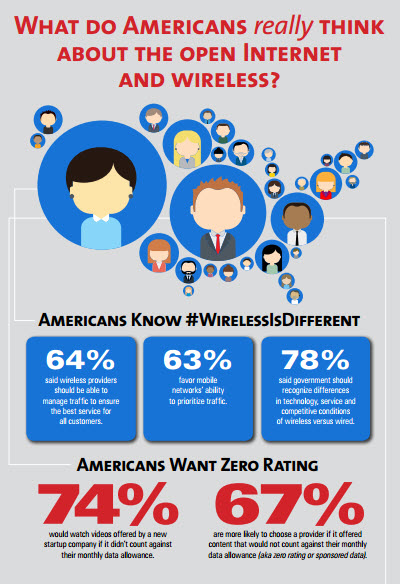Last spring, the World Wide Web turned 25. And in its relatively short lifespan, Internet access has become vital to modern life. Numerous broadband-enabled devices have been developed, and high-speed connectivity now delivers opportunities to us that we could only imagine not long ago. This connectivity is an important resource for small businesses, professionals, and entrepreneurs, as well as for families, students, and diverse communities.
For women business owners, high speed Internet has enabled them to increase efficiency of business operations, improve customer service, reduce cost, and grow by reaching new customers and markets. The most significant impact that high-speed connectivity has provided to women is flexibility, allowing them to start and grow their businesses regardless of whether they are working from an office, their home, or while on the go.
These advancements and innovations happened under a light-touch regulatory approach, which was wisely adopted and adhered to for many years. This approach increased private investment in new technology and networks, allowed innovations to thrive, and helped increase high speed Internet adoption rates. Unfortunately, we are now facing a radical change in course by the Federal Communications Commission (FCC), which regulates interstate and international communications by radio, television, wire, satellite and cable.
Later this month, the FCC is expected to pass burdensome net neutrality rules created in the 1930s that reclassify the Internet as a public utility. This approach is guaranteed to slow investment into our country’s networks and jeopardize high speed Internet adoption at a time when encouraging both is especially vital to the success of our economy, our small businesses, and our families. Net neutrality must be preserved, but the proposed FCC rules will do more harm than good. They call for a drastically altered course, one that would sabotage the approach that has helped the Internet thrive from the beginning.
Fortunately, there’s another solution. Congress can design rules that will protect net neutrality and consumers. By offering opportunities for bipartisanship, lawmakers can work together to eliminate real threats to the Internet and to establish clear legal guidelines for the FCC. This solution can also ensure that we get the right level of regulation, more in line with the light-touch framework that has worked so well for the past few decades.
A light-touch legislative solution that prohibits blocking, throttling, and paid prioritization while also protecting consumers and avoiding legal limbo, will lead to even more innovation and investment in our country’s Internet infrastructure. It will also ensure that that all Americans, such as the fastest growing segment of small businesses – women business owners – have access to high-quality Internet and the technology they need to continue to grow our economy.
Tell Congress We Need #NetLawNow!
Below is a piece by the Multicultural Media, Telecom & Internet Council (MMTC, formerly Minority Media and Telecommunications Council), a national nonprofit organization dedicated to promoting and preserving equal opportunity and civil rights in the mass media, telecommunications and broadband industries, and closing the digital divide. MMTC is generally recognized as the nation’s leading advocate for minority advancement in communications.
Bad Choices Can Make Today’s Internet Tomorrow’s Memory.
Here’s what is happening right now to your Internet: On Thursday, February 26, the Federal Communications Commission (FCC), the government’s independent agency that oversees the media and telecommunications industries, is about to deliver a groundbreaking decision that will affect your Internet.
Consumers need to speak up because the FCC’s actions can take away the benefits that we enjoy today and in the future.
Why Should YOU Care?
- TODAY’S INTERNET GIVES YOU POWER. You choose from all kinds of plans and combinations, from low-cost pre-paid plans, all the way up to that family plan with the special music collection you like. Tomorrow’s Internet could have all of these programs eliminated under new FCC rules.
- TODAY’S INTERNET GIVES YOU ACCESS. We all move around the Web, accessing movies, photos, emails, and whatever we want on our smartphones and tablets. Tomorrow’s Internet could negatively impact where and how we use the Internet under new FCC rules.
- TODAY’S INTERNET IS GETTING CHEAPER. Over the last few years, the price of broadband has been decreasing. Tomorrow’s Internet costs may increase and make it harder for some of us to pay. New, unnecessary taxes and fees on services could also open up from Thursday’s FCC rules, hitting you and your family in the wallet.
Today’s Internet is OPEN, and after Thursday, consumers won’t get anything that they didn’t have – except more rules, less choice, and the possibility of higher costs.
We are running out of time, and we need everyone to join in on the conversation! Contact your Representative so we can all enjoy the benefits of the Internet today and tomorrow!
Tweet #NetLawNow and tell your Members of Congress that you want them to act now to keep the Internet open!
38.907192
-77.036871
 e appointed by the President and serve five-year terms. While we doubt anyone questions Chairman Wheeler’s integrity, the next set of Commissioners may not hold the same view. Second, regulating rates in utility- style fashion does not really fit the fast moving technological changes that come with the industry providing internet services. Third, talk about a damper on investment – subjecting broadband networks to the government’s slow ratemaking process would surely have a negative effect.
e appointed by the President and serve five-year terms. While we doubt anyone questions Chairman Wheeler’s integrity, the next set of Commissioners may not hold the same view. Second, regulating rates in utility- style fashion does not really fit the fast moving technological changes that come with the industry providing internet services. Third, talk about a damper on investment – subjecting broadband networks to the government’s slow ratemaking process would surely have a negative effect.


 r this year, the FCC voted to adopt overbearing “Title II” regulations that have already led to legal battles which will likely extend for the next several years. What is Title II? Title II of the Communications Act of 1934 would grant the FCC additional regulatory authority; this is the authority they utilize over telecommunications services currently. Plenty of experts and economists, as well as the small business community, warned against the consequences of applying outdated Title II regulations on our country’s Internet infrastructure. For small telecom providers especially, it’s quickly becoming clear that Title II is detrimental to growth and investment in their businesses.
r this year, the FCC voted to adopt overbearing “Title II” regulations that have already led to legal battles which will likely extend for the next several years. What is Title II? Title II of the Communications Act of 1934 would grant the FCC additional regulatory authority; this is the authority they utilize over telecommunications services currently. Plenty of experts and economists, as well as the small business community, warned against the consequences of applying outdated Title II regulations on our country’s Internet infrastructure. For small telecom providers especially, it’s quickly becoming clear that Title II is detrimental to growth and investment in their businesses.
